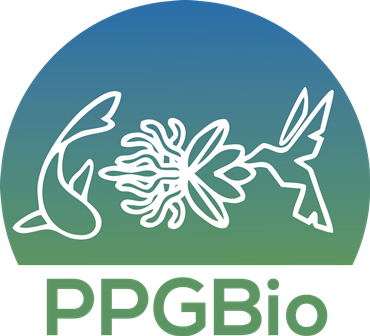Self-evaluation 2021–2024
The PPGBio self-evaluation analyzed academic indicators, program structure, social impact, and institutional perspectives. The methodology was based on a SWOT analysis, questionnaires distributed to faculty and students, and collegiate deliberation. The full details of this assessment are available in the PPGBio four-year report on the website ww2.pgb.ufrpe.br.
1. Academic Structure and Faculty
PPGBio concluded the 2021–2024 period with 27 faculty members (81.5% permanent), working across three research lines: Systematics and Evolution; Structure and Functioning of Biodiversity; and Biodiversity Use and Management. Of these, 51.9% work exclusively in PPGBio, and 37% are research productivity fellows (CNPq or FACEPE). The program’s infrastructure includes 24 laboratories and 6 institutional scientific collections, as well as partnerships with other universities and research centers.
2. Scientific Output and Faculty Quality
PPGBio’s scientific output between 2021 and 2024 was evaluated using indicators such as high-quality publications and student advising. Highlights include:
-
177 Qualis A1–A4 articles co-authored with students or alumni;
-
An average of 6.1 co-authored articles per faculty member, with the most productive reaching an average of 9.6;
-
59.1% of faculty published at least two A1-ranked articles;
-
Average H-index of 12.3 (Scopus); average FWCI of 1.5 — indicating international visibility and impact;
-
92% of permanent faculty completed student supervisions during the period, with a median of 3 per advisor.
3. Master's and Doctoral Graduation
Between 2021 and 2024, 95 students completed their degrees (31 PhDs and 64 MScs). Of those, 70.5% published Qualis A1/A2 articles. The number of graduates decreased by 14.4% compared to the previous period, a reduction attributed to the COVID-19 pandemic and its exceptional extensions.
4. Alumni: Career Pathways and Impact
A follow-up of 226 alumni revealed a high employment rate in the biodiversity field:
-
65% are employed in teaching and/or research institutions: 39% as professors, 26% as researchers;
-
7% are in postdoctoral positions, in Brazil or abroad;
-
5% work in the private environmental sector;
-
Only 1% are unemployed, and 2% are working outside the field.
The alumni profile is predominantly female (61%). These outcomes highlight the program’s effectiveness in providing high-quality training and facilitating career continuity in academic and scientific fields.
5. Internationalization and Fundraising
The program has 18 partner institutions across 9 countries (e.g., France, USA, Argentina, Portugal).
PPGBio secured R$ 6.4 million in research funding and R$ 154 thousand for outreach activities.
Eight faculty members led internationally funded projects.
PPGBio is also involved in UNESCO initiatives (e.g., Ocean Literacy).
6. Social Engagement and Visibility
72% of faculty members engage in partnerships with public institutions and NGOs.
Twenty-four outreach projects were carried out, with 100% student participation in the 2023 and 2024 cohorts. Highlights include:
-
Minimuseum of Animal Life – an interactive space for science communication;
-
Startup Blue Impact – focused on sustainability of marine resources;
-
The Plankton Revolt – an educational book widely used in schools.

